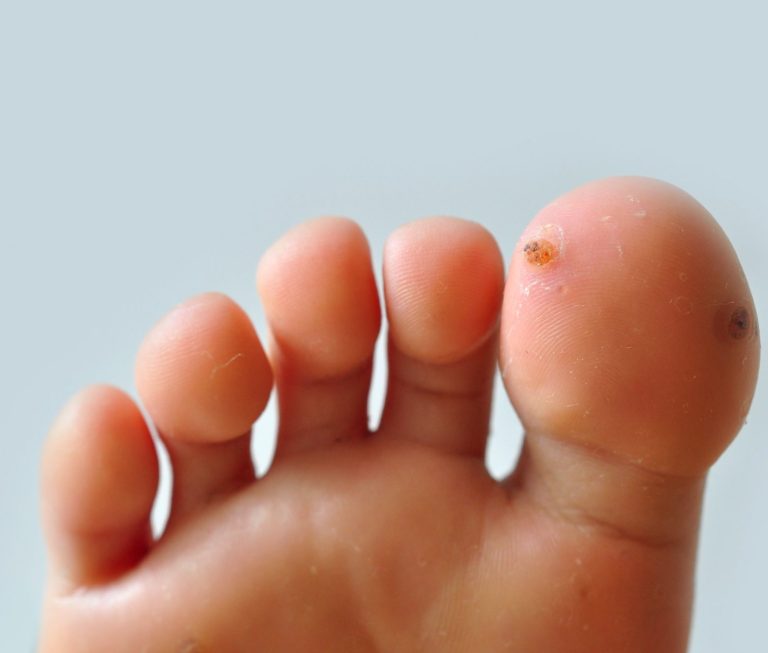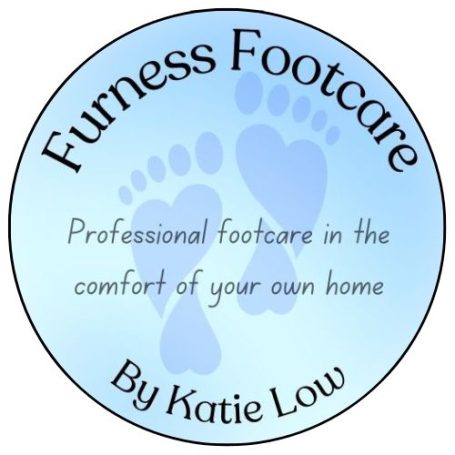Treatments
Each home visit in the Barrow-in-Furness area will cost £32 for general foot care. This includes nail cutting and filing, reducing any thickened nails, debridement of callus, cracked heel care, corn removal and will finish will a foot massage. There is a reduced cost to £30 per person for those living in the same household. I will provide advice, where required, on diabetic care, self care for prevention of issues and foot health promotion. For the best care for your foot heath, 6-8 weekly appointments are highly recommended. There is an increased cost dependent on need for Verrutop treatment and travel further afield, please contact me to discuss further.

Nail Cutting/Filing
Overgrown/sharp toe nails can have a negative impact on our overall health leading to pain, falls, poor mobility and wounds which can lead to infections. There are many reasons why you may not be able to attend to your own nails ie. dexterity, eyesight and mobility issues and this is when I am here to help!

Callus Debridement
People of all ages can develop calluses on the feet which is caused by pressure or friction on the skin. This can be due to a number of factors such as tight/ poor fitting footwear, biokinetics, sports and genetics. Thick callus requires sharp debridement with a blade, if left untreated this can lead to pain, corn formation and foot ulcers.

Corn Enucleation
Corns develop when the skin tries to protect itself from friction or pressure, they are often painful and are caused by a build up of dead skin which has been left untreated. Corns often have a hard centre which leads to pain when pressure is applied to the area and a feeling of a hard object in the skin. This hard centre requires enucleation, normally with a blade. Although corns are often painful to live with, removal is generally pain free.

Diabetic Footcare
It is vital that people with diabetes and poor circulation practice good foot care to prevent problems occurring. Correct nail cutting for these patients is vital as even a small cut can cause infection and further complications. People with diabetes are more likely to develop corns, callus, fungal infections and nerve damage which can all lead to foot ulcers. Foot ulcers in diabetic's are very difficult to heal and have a high infection rate. Infection in the feet can lead to gangrene and can result in amputation. 10% of adults in England have diabetes, many more which are undiagnosed.

Fungal and thickened nail reduction
Fungal nail infections (onychomycosis) and trauma can lead to nails to become thickened making it really difficult to trim. Reduction of the nails can reduce discomfort and improve the appearance of the nail. In addition, reducing the nail thickness can help topical fungal treatments penetrate the affected area. There is a vast variety of topical treatments available to purchase from pharmacy's and supermarkets. In severe cases the GP may prescribe an alternative oral treatment.

Verrutop
Verruca's (plantar warts) are small lumps that appear on the feet caused by the human papillomavirus (HPV). Verruca's can be contagious and spread to other people through skin to skin contact or indirect contact with contaminated surfaces ie. communal changing rooms/swimming baths. Verruca's are harmless but can cause pain and often form callus over the area which again can lead to discomfort. There are many treatments that are available to purchase from pharmacy's and supermarkets. There is no guaranteed treatments that will remove verruca's however, I provide Verrutop treatment, due to its high success rate. Verrutop is a topical nitrizinc complex solution that breaks down its protein structure. This leads to the lesion drying out and helps kill cells leaving healthy skin underneath.
Treatment is normally quick and painless. 90% of cases will resolve after an average of 3 treatments and a maximum of 6. The treatment is required to be repeated every 10-14 days if the verruca is still present. There is a 10% chance that even after the maximum amount of treatments, Verrutop would still be ineffective. Initial treatment £65, follow up treatments every 10-14 days £15.

Cracked heels
Cracked heels are also known as heel fissures. Heels can often be very painful to walk on and can lead to bleeding, if left untreated cause infection. People often find cracked heels worse in the summer months when they are wearing open shoes. Cracked heels often requires removal of callus with a scalpel or electric file procedure. It is important that dry heels are maintained between appointments with moisturising cream.

Ingrowing toenails
An ingrowing toenail often affects the big toe on one or both sides. The nail curls and curves into the side of your toe causing pain and inflammation. Ingrown toe nails can be caused by poor toenail cutting, wearing tight fitting shoes, sweaty feet, injury or natural shape of the nail (involuted). I can provide nail care to remove and smooth the sharp edges of nails to try and prevent reoccurrence. A non-surgical treatment and advice I can provide is toenail packing which can help the nail grown over the skin instead of into it. If a toenail is ingrown and has caused a wound/signs of infection you will need to see your GP or Podiatrist for specialist treatment.
We need your consent to load the translations
We use a third-party service to translate the website content that may collect data about your activity. Please review the details in the privacy policy and accept the service to view the translations.

